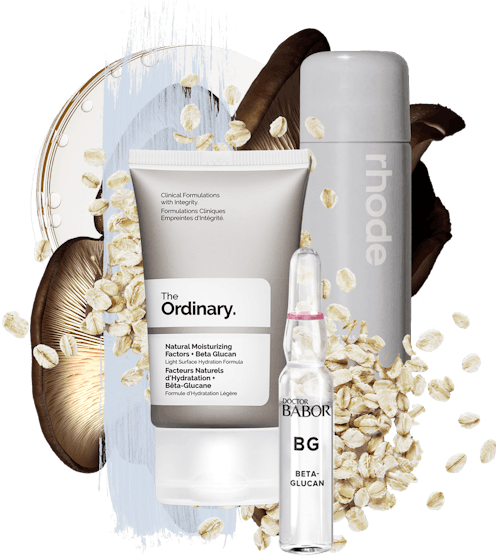(Back To Basics)
This Under-The-Radar Ingredient Is Finally Getting Its Moment In The Spotlight
It works wonders on wrinkles.

With new products, brands, and categories popping up every day, beauty can be a bit overwhelming. Back to Basics is our rudimentary beauty series that serves as your crash course on the science behind some of the best formulations in the game. This week, we’re taking a look at beta-glucan for skin.
Some of the very best skin care ingredients are beneficial for you inside and out, and one of them goes by the name of beta-glucan. This polysaccharide, a type of carbohydrate, is derived from a variety of natural compounds like algae, fungi, oats, barley, and even bacteria. Beta-glucan has been shown to lower cholesterol and glucose when ingested and has prebiotic properties that are good for your gut — making it a dietary staple for those who are seeking preventative measures for various digestive conditions. When it comes to eating beta-glucan, you can find this soluble fiber in certain cereals, mushrooms, and seaweed.
But the benefits of this gut-nourishing ingredient don’t end there — beta-glucan is also a known humectant that helps boost the skin barrier with hydration, making it a valuable component of skin care products for sensitive skin types. It also contains antioxidant properties that help ward off free radicals, UV, and pollution, making it a viable anti-aging ingredient as well. It can be found in a variety of skin care formats, from essences to serums and moisturizers.
Ahead, TZR tapped three dermatologists to learn more about beta-glucan, including the ingredient’s benefits, side effects, and how to incorporate the gut-friendly additive into more than just your diet, but into your skin care routine, too.
What Is Beta-Glucan?
According to Dr. Nava Greenfield, M.D., a New York City-based board-certified dermatologist at Schweiger Dermatology, beta-glucan is a molecule that comes from natural sources like bacteria, yeast, and plants and is used in skin care because of its hydrating and antibacterial properties. “It acts by stimulating certain cells in the skin’s immune system to activate against invading pathogens,” she says.
Dr. Papri Sarkar M.D., a Boston-based board-certified dermatologist, shares that beta-glucans are thought to have antioxidant and anti-inflammatory effects on the skin, which makes the ingredient very favorable to our immune systems.
Beta-glucan can help minimize redness, soothe inflammation or sensitivity, strengthen the skin barrier, and even play a role in anti-aging, according to Sarkar. Beta-glucans have antioxidant properties that can mitigate the aging effects of oxidative stresses like sun damage, which is ideal if you’re looking to reduce the appearance of fine lines and wrinkles. “Additionally, beta-glucans have been shown to help promote wound healing by enhancing the skin’s natural repair process,” she notes.
Who Should Use Beta-Glucan & What Are The Side Effects?
“While it can be used by any skin type, beta-glucan is particularly great for dry, sensitive, or irritated skin,” says Dr. Hadley King, M.D., a New York City-based board-certified dermatologist. It’s also particularly beneficial to those who have a compromised skin barrier due to hyper-reactive skin, or even eczema.
Beta-glucan is generally well tolerated by all skin types and doesn’t have any particular side effects, but the experts warn that, like all ingredients, there is potential to have a sensitivity to it, especially if you have an allergy to mushrooms, oats, barley or seaweed. If this is a possibility, avoid using skin care products with beta-glucan, or patch-test them on your forearm for confirmation before use.
How To Use Beta-Glucan In Your Skin Care Routine
Beta-glucan can be found in myriad of skin care products. “It is easy enough to use a moisturizer that incorporates this ingredient as one of its actives,” says Greenfield.
After cleansing, toning, and applying vitamin C, the experts recommend opting for a moisturizing serum or cream with beta-glucan before you apply your SPF. “Some forms [of beta-glucan] have film-forming properties as well that can boost the skin barrier to help retain moisture,” King says, which means beta-glucan is a great ingredient to use around the clock for hydrated, resilient skin. If you choose to apply the ingredient at night, use it before your moisturizer if it’s in a serum or essence format, or as the last step if it’s in a cream or gel moisturizer.
Scroll on for a handful of beta-glucan products that can kick off your skin-boosting journey.